PHUKET: A record number of more than 9000 Rohingya boatpeople took to the seas in November to start a new life, the most accurate figures available show.
The men, women and children were fleeing from harsh conditions in Bangladesh or persecution in Burma (Myanmar), according to Chris Lewa of the advocacy group, the Arakan Project.
''We've never seen so many people make the trip before in a single month,'' Ms Lewa said yesterday.
The figure does not include what's believed to be many more thousands fleeing from further south in Burma, around the town of Sittwe, where the media and NGOs are restricted in their movements or banned entirely.
Most of the Rohingya are being processed through Thailand and smuggled across the border into Malaysia in a large-scale, secret operation that is thought to be officially sanctioned.
In many cases, it's believed that Thai military or paramilitary oversee the mass exodus along the Andaman Sea coast and pass on the thousands of Rohingya to people smugglers.
Most of the boatpeople willingly submit to the perils of the journey and the payment of large sums of money because conditions in Burma continue to be made unbearable under a tactily-sanctioned ethnic cleansing program to rid the fledgling democracy of Rohingya.
In Thailand, though, recent reports by Phuketwan, the South China Morning Post newspaper and Reuters news agency have highlighted the appalling conditions in makeshift transit camps along the Thai-Malaysia border.
Escapers from the camps have told of life-threatening conditions, with Rohingya tormented or beaten as they make telephone calls to relatives seeking money.
As many as 16 deaths occurred in a single camp in the space of 14 days, one escaper told Phuketwan. The same escaper said that women were raped in the camps by other Rohingya.
Often, men who cannot find relatives to pay for their transfer to Malaysia will be forced to become ''security guards'' and made to beat their fellow Rohingya, sources say.
The camps are patrolled by armed guards. Escapers, if caught, are severely punished.
Requests from the United Nations and the US for investigations in Thailand following the media reports about the camps early this month have yet to be acted upon, feedback from officials indicates.
Telephone calls to General Panu Kerdlabpon, the Commander of the Immigration Bureau, whose officers have been accused of assisting the trafficking, have not been answered.
A spokesperson at the Foreign Ministry acknowledged receipt of a request from the UN for an investigation but said any questions that Phuketwan journalists might have would need to be conveyed by letter.
The mass exodus of Rohingya from Burma is known to have been underway for about 20 years. Once accepted as one of the many ethnic groups in Burma, the Rohingya were declared unwanted and made stateless in 1982.
In recent so-called ''sailing seasons,'' the numbers of Rohingya taking to the sea to escape usually peaks in December and January and continues through until the arrival of the monsoons in April.
The men, women and children were fleeing from harsh conditions in Bangladesh or persecution in Burma (Myanmar), according to Chris Lewa of the advocacy group, the Arakan Project.
''We've never seen so many people make the trip before in a single month,'' Ms Lewa said yesterday.
The figure does not include what's believed to be many more thousands fleeing from further south in Burma, around the town of Sittwe, where the media and NGOs are restricted in their movements or banned entirely.
Most of the Rohingya are being processed through Thailand and smuggled across the border into Malaysia in a large-scale, secret operation that is thought to be officially sanctioned.
In many cases, it's believed that Thai military or paramilitary oversee the mass exodus along the Andaman Sea coast and pass on the thousands of Rohingya to people smugglers.
Most of the boatpeople willingly submit to the perils of the journey and the payment of large sums of money because conditions in Burma continue to be made unbearable under a tactily-sanctioned ethnic cleansing program to rid the fledgling democracy of Rohingya.
In Thailand, though, recent reports by Phuketwan, the South China Morning Post newspaper and Reuters news agency have highlighted the appalling conditions in makeshift transit camps along the Thai-Malaysia border.
Escapers from the camps have told of life-threatening conditions, with Rohingya tormented or beaten as they make telephone calls to relatives seeking money.
As many as 16 deaths occurred in a single camp in the space of 14 days, one escaper told Phuketwan. The same escaper said that women were raped in the camps by other Rohingya.
Often, men who cannot find relatives to pay for their transfer to Malaysia will be forced to become ''security guards'' and made to beat their fellow Rohingya, sources say.
The camps are patrolled by armed guards. Escapers, if caught, are severely punished.
Requests from the United Nations and the US for investigations in Thailand following the media reports about the camps early this month have yet to be acted upon, feedback from officials indicates.
Telephone calls to General Panu Kerdlabpon, the Commander of the Immigration Bureau, whose officers have been accused of assisting the trafficking, have not been answered.
A spokesperson at the Foreign Ministry acknowledged receipt of a request from the UN for an investigation but said any questions that Phuketwan journalists might have would need to be conveyed by letter.
The mass exodus of Rohingya from Burma is known to have been underway for about 20 years. Once accepted as one of the many ethnic groups in Burma, the Rohingya were declared unwanted and made stateless in 1982.
In recent so-called ''sailing seasons,'' the numbers of Rohingya taking to the sea to escape usually peaks in December and January and continues through until the arrival of the monsoons in April.

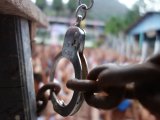
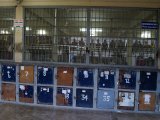
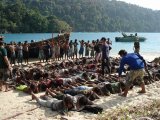
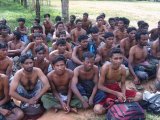
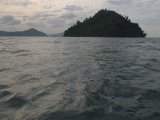
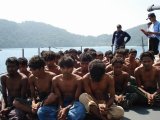


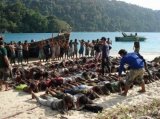
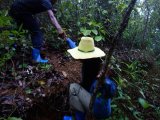

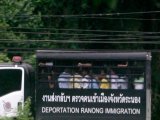



According to our report from ground ,the figure is more . Around 20000 thousands Rohingya escaped from genocide by boat/ship within November to now . We have got around the clock news from South to North Arakan. From North Arakan ,most of the small boat people are transferred into big ship from Thailand in the middle of the sea. The brokers arrange the big ship where 500-700 persons can be loaded.They are mostly safe and arrive safely at Thai coast. The Rohingyas from South Arakan have no connection with Thai Ship so they use very small fishing boats to voyage to Thailand . Most of the boats are not reachd to Thai cost whether drowned or voyage to other direction due to bad weather or lack of fuel.This kinds of boat people are hardly documented. The Burmese authority indirectly pushing the Rohingya to leave the country.On the other side, traffickers are very desperate due to the political unrest in Thailand.They are well organized and conducting trafficking . The misery of boat people are very dire at the concentration camp of traffickers in the south Thailand. The death news and missing news are always heard. Some of them are believed to be sold to deathly fishing trawlers. The UNHCR is very weak and slow to take action in this regards in Thailand. We don't know yet how many Rohingyas are in the IDCs and police custody in Thailand now. There were more than 2000 Rohingya detainees in Thai custody some months ago. We would like to know details of them . If civil society and UN are ignoring our call for urgent solution of trafficking cases and protect the Rohingya from genocide ,the influx of Rohingya and death tools will be more higher in this sailing seasons. Therefore ,we are ardently asking to tackle the Rohingya case internationally.We don't know where to proceed to ask help in this critical times. We have went to US and UK Embassies asked their good office to keep contact to the Secretary General of United Nations for international protection.The only option to stop Rohingya tragedy is sending UN Forces to Rohingya area for protection and tracing out human traffickers .The civil society of Thailand should come forwards in this regards.
Posted by Maung Kyaw Nu,President,Burmese Rohingya Association in Thailand (BRAT) on December 14, 2013 07:22